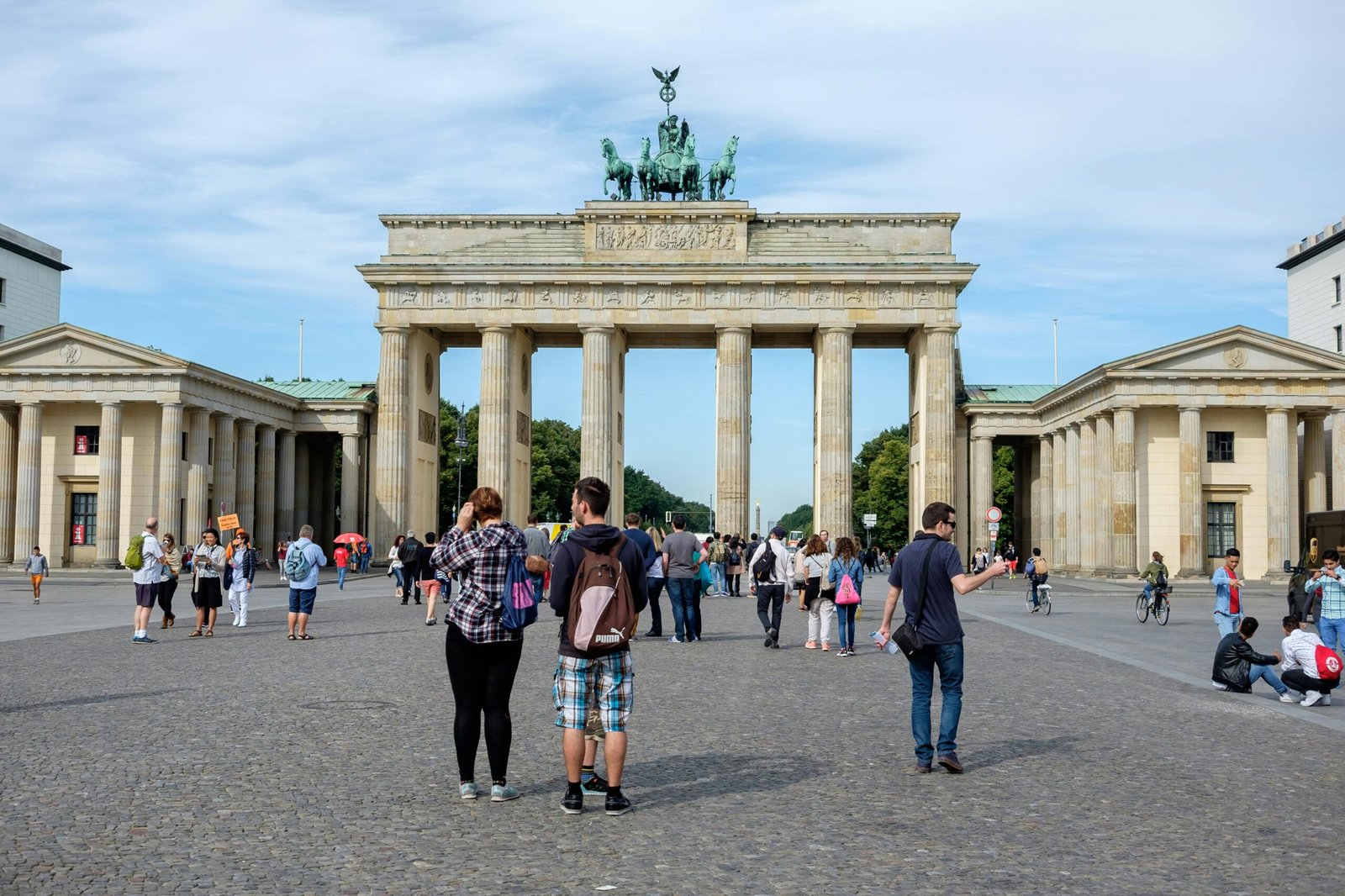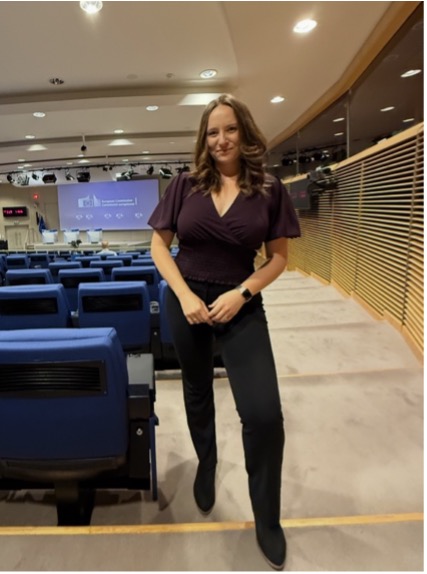
Lillian Donahue, ABC 15, Phoenix, Arizona
To say the RIAS Berlin Commission Fellowship was fantastic almost feels like an understatement. I finished the program feeling inspired, knowledgeable and passionate about transatlantic relations and the free press. We embarked on this journey at a pivotal time for the United States, Europe and specifically Germany, as defense spending, trade and international diplomacy shifts into a new normal. Being able to speak with NATO officials and the European Commission less than a week before the NATO summit was incredible. Walking the Berlin wall with the man who started the east side Gallery, and going into a Stasi prison with a man who attempted to escape East Germany are once in a lifetime learning opportunities that I will always cherish. Then there are the reporters, the newsrooms, the new networks and the opportunity to learn about the media half a world away. At RBB, I learned about our similarities on in day-to-day field reporting, and the differences in the way media landscape is supported. A monumental thank you to everyone who helps put this program together, for it’s something I would never have the opportunity to do otherwise. I cannot wait to take what I’ve learned back to my newsroom and my daily reporting.
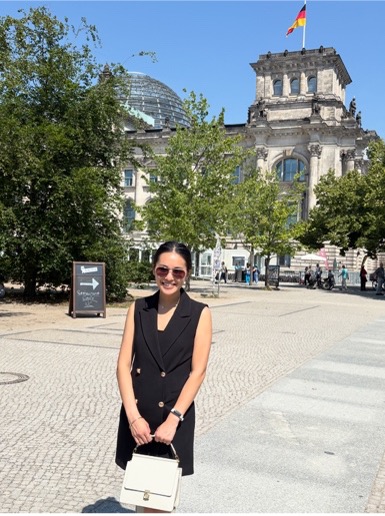
Aimee Cho, NBC 4, Washington, D.C.
RIAS was such an incredible, life-changing opportunity. From visiting NATO and the European Commission, to meeting with think tanks and policy makers, to shadowing for two days at DW News, to learning about Germany’s history and government, I gained so much perspective in the two week program and am coming away with a renewed passion and excitement for covering news. It was fascinating to see how journalists and newsrooms of various media types (broadcast, radio, newspaper) operate in Belgium and Germany. Hearing from Peter Keup, a historian who was held as a political prisoner in an East German Stasi prison, was profoundly emotional and I am deeply grateful to him for sharing his experience with us. All the speakers were fascinating and I greatly appreciated them taking time out of their busy schedules to meet with us and share their insights. I also loved being able to experience the rich culture of Berlin – museums, food, a summer solstice pop up music festival, flea markets, and more. My cohort was fantastic and I know we will all stay lifelong friends. And couldn’t have asked for better leaders than Chris Jumpelt and Christina Reif – they worked so hard to create a fulfilling, enriching experience for us.

Ryan Cooper, Spectrum News, Los Angeles, California
I am so thankful to have participated in the RIAS German-American Journalist Program. I remember when Chris interviewed me for the fellowship opportunity, he asked what a journalist of my experience could learn that I didn’t already know. Turns out, quite a lot. At NATO headquarters, we heard firsthand how the war in Ukraine – and the threat Russia poses to Europe – has emerged as the major focus of the alliance. Our visit coincided with efforts to get members to increase their domestic military spending rather than rely on America for its defense. A recurring theme emerged — that President Trump has laid the groundwork for a “slow divorce” from Europe. It’s a view that isn’t entirely shared, but even if we aren’t headed for a divorce, the relationship is going to be moving in a new direction, and that is unavoidable. At the European Commission and the German Marshall Fund, we heard how Europeans are worried about Trump’s tariffs policies — and what they described as his haphazard approach to foreign policy. I enjoyed my station days at DW News. Several of the people I spoke with suggested that senior managers are seriously considering closing the TV channel and focusing entirely on digital, particularly their growing YouTube platform. I do believe this would be a mistake. The channel serves as a content engine for digital, and the content is widely shared on YouTube. As CNN International simulcasts more of CNN USA, and BBC World has merged with its domestic service, I believe there is still a need for an English-language international news channel. I also was fascinated by the verification presentation at RTL in Cologne. Burak Kahraman was an interesting guest speaker, and I think he’ll continue to have an important job as AI videos become more common – and harder to detect! It was great to get varied perspectives on America’s role in the world, how we are perceived and how Trump’s policies are viewed. And the visits to various news outlets in Germany helped showcase the strong role the media play there. I will always look back fondly on my experience during this program, and I am so glad I was selected to take part.
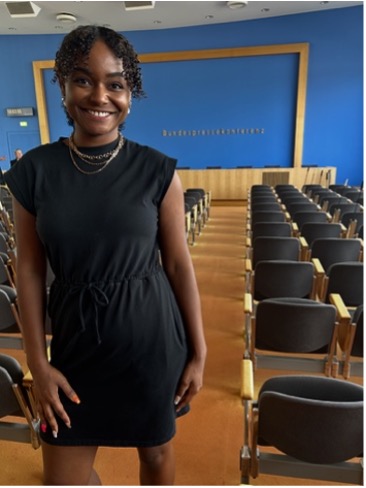
Janelle Finch, 9NEWS, Denver, Colorado
Words cannot describe the opportunity I had to be able to expand my international knowledge and awareness through the RIAS Berlin Commission. I am so thankful to have been a part of such an esteemed group of journalists to be able to sit in rooms with national spokespeople, transatlantic leads and accredited journalists. I am living beyond my dreams. While in Brussels, we had the chance to visit NATO and the European Commission. Not only were we allowed into these internationally recognized spaces, we were there when NATO and the Commission were bustling with energy, preparing for the NATO Summit and considering the future of EU trade with the United States with Trump’s demand of 5% defense investments. We were able to take current events and apply them to real-time conversations. We heard many differing opinions on what the future relationship of the EU and U.S. may look like, but all agreed nothing can be predicted with the current administration so only time will tell how work and jobs in the EU will be influenced in the coming weeks and years. When we moved to Cologne, we visited one of Germany’s news leaders, RTL. Here, we talked about AI and how it is both challenging and supporting newsrooms. I was really intrigued to learn some news spaces are considering using AI to generate b-roll of generic life scenes. In Berlin, we deepened our understanding of how day-to-day German journalists work while on station day visits. I was assigned to Deutschland Funk Radio where I was completely immersed in a space different from my own, producing highly tuned into radio shows and podcasts, talking to and about political newsmakers. I can’t forget to highlight that while we took a lot of time talking about journalism and politics, we also talked about culture and the things that shaped Germany history. From seeing memorials across Berlin, commemorating the fall of the Berlin Wall to walking the East Side Gallery with the man behind the vision to touring a Stasi prison with a former prisoner, RIAS connected us to individuals we couldn’t have ever believed we would have a chance of interacting with. I cannot be more thankful and appreciative for the Commission and all of its partners for coming together to provide us with such a bountiful and worldly experience.

Bradley George, WUNC, Chapel Hill, North Carolina
The final two weeks of June 2025 were a hell of a time to be among a group of American journalists in Europe. We watched, in real time, as NATO and the European Union raced to respond to the Israeli and US strikes on Iran. We spoke with newsroom colleagues about the challenges of disinformation, AI, and audience decline. During a station visit to Deutschlandfunk Kultur (housed in the former RIAS headquarters), I was asked to step behind the microphone and talk about the precarious situation with federal funding of public media in America. The meager amounts doled out to public broadcasting in the US pale to the billions received by Germany’s complex public media ecosystem. But we learned through a quick visit to MDR in Leipzig that the future of this funding faces a cloudy future of its own. I returned to the US exhausted, jet lagged, and just a little bit sunburnt. But I would not trade this experience for anything. I’m grateful for my new connections and friendships with colleagues on both sides of the Atlantic. And I look forward to putting what I’ve learned to work in my own newsroom.
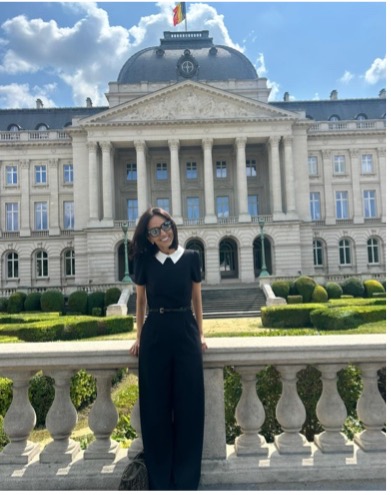
Annette Arreola, KNBC, Los Angeles, California
I was part of the June 2025 cohort of American journalists that traveled to Belgium and Germany. Prior to flying out to Brussels, I was covering the unrest breaking out in the streets of Southern California, following the massive immigration raids by ICE. Just days after arriving in Europe, the global headlines shifted from the NATO summit at The Hague, to the U.S. air strikes targeting Iran. These world events, both domestic and international, make it abundantly clear, just how important our work is at this very moment in time. It also highlights the need to protect freedom of the press. The RIAS fellowship was an incredible and one of a kind experience from start to finish. From visiting NATO and the European Commission, to our meetings with think tanks and German journalists; the program offered a unique opportunity to gain a global perspective on policy issues that every day working communities on both sides of the Atlantic are concerned about. From tariffs to security, along with discussions ranging from cultural and religious diversity.. the RIAS program exposed us to history and its impact on present day Germany! There were many memorable moments throughout the fellowship. From my newsroom assignment at RTL, to spending time at the Bundestag while Chancellor Merz delivered his speech to the German parliament. Meeting Peter Keup, and listening to his account of what it was like to be incarcerated in a Stasi prison, is something that will forever stay with me. But above all, what RIAS has created, is a network of journalists, who are not just committed, but also deeply passionate about working together and strengthening our transatlantic friendship, through the most difficult of times. I take with me an abundance of knowledge and understanding of how my colleagues carry out their work across the world! We are not just colleagues..we are a network of friends! And with that, RIAS Berlin Commission, you have my deepest gratitude!
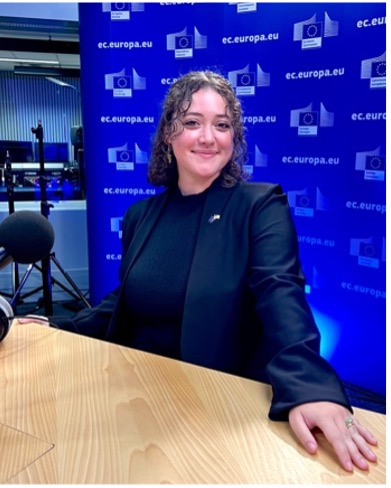
Mia Salenetri, CBS News, Washington, D.C.
My two weeks with the RIAS fellowship gave me a deeper understanding of the history and importance of the German-American and Transatlantic partnerships. Traveling not as tourists, but as journalists, gave us an insight we otherwise would not have just by reporting on these global issues from afar. Visiting newsrooms and talking with journalists provided a look at the different ways German and American journalists view the profession and the industry, in turn informing the perspectives we return to our newsrooms with. In addition to all of the professional development, I feel like I formed bonds for life with the rest of my fellows. It was an unforgettable experience with a group of unforgettable people.
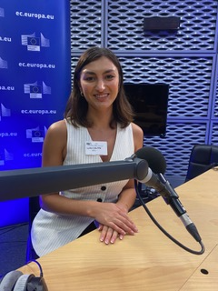
Lydia Calitri, NPR, Washington, D.C.
As someone who eventually wants to live and work abroad, the RIAS fellowship was an incredible experience I’m so grateful to have been a part of. During a time of political and economic uncertainty between the U.S. and the EU, my cohort aimed to answer one question: are ties getting stronger, or are we heading for a “long-term divorce”? While officials at NATO, the European Commission and the Bundestag told us U.S./EU relations are continuing to improve under the second Trump administration, the think tanks, companies and special interest groups we spoke to believe the opposite due to tariffs, the wars in Ukraine and Israel and job cuts within the State Department. Asking experts directly about these issues was such a unique opportunity, and it proved that there’s much more to be done to secure this relationship. I was also fascinated by how much more respected journalists are in Germany compared to their U.S. counterparts. During my station days at WELT, I got to shadow a TV reporter and I was surprised by the amount of autonomy they have when it comes to pitching, writing and editing their own packages. Visiting the Bundepreskonferenz was such an eye-opening experience because in the U.S., we are always chasing down politicians for comment, but in Germany the politicians come to the press. But for me, the best part of the trip was bonding with the journalists I met both in my cohort and the newsrooms I visited. Interacting with them has also inspired me to continue studying different languages, including German and French. The friendships I’ve made and lessons I’ve learned from the RIAS fellowship are ones I know will last a lifetime.

Sam Meyer, CNN, New York
It’s hard to reduce such an intense experience as the RIAS program into a couple hundred words, but over the course of the two weeks, I was most often struck by the generosity of everyone we encountered. Chiefly, the generous gift of our hosts’ time, but I’m also grateful for the commission and the organizers of the program itself for organizing and executing a full slate of briefings, interviews, and station visits, as well as the logistical work of getting us to, from, and around Europe. I was amazed that so many different organizations gave us time and access, from think tanks to news organizations, governmental officials, and even artists and historians. Moreover, we were encouraged to ask tough questions and not shy away from controversial topics. We had uniformly thoughtful discussions on AI, funding media, fact-checking and verification, the rise of far-right political movements in the US and Germany alike, antisemitism, international trade, defense funding and alliances, and other important issues. The station days were a particular highlight; I enjoyed seeing behind the scenes at WELT TV, especially on some busy breaking news days. They had lots of questions for me as well, and it was good to connect with journalists who work in a similar environment and to discuss issues of mutual concern. It was also great to connect with RIAS alumni and friends at the mixer in Cologne and with other American journalists at dinner in Berlin. I found the tour of the former Stasi prison at Hohenschönhausen with former political prisoner Peter Keup to be quite eye opening, especially in his descriptions of the mass psychological warfare on entire populations that characterized life in the East. Now that I am a RIAS alumnus myself, I look forward to maintaining the connections made during the trip, and to being an active part of the transatlantic alumni network.
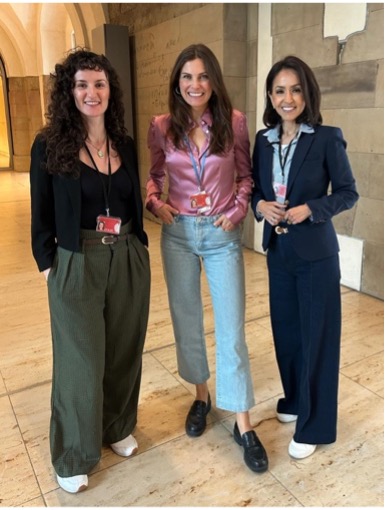
Cristina Maza, National Journal, Washington, D.C.
The RIAS Berlin Journalist Program was extremely rewarding. We were able to meet with key spokespeople from institutions in Brussels, such as NATO and the European Commission. Our briefings were in-depth and informative, and we were encouraged to ask tough questions. In Cologne, we met journalists from various media outlets and learned about what it’s like to report in Germany. I especially appreciated our station days in Berlin, during which we had the opportunity to shadow journalists who perform similar roles to those we have at home. I watched the Chancellor’s speech in the Bundestag, attended many press conferences, and spoke to German lawmakers. I was also happy that we had the opportunity to tour a Stasi prison in East Berlin and learn about the region’s history from Peter Keup, a historian who had been imprisoned in East Germany as a young man. The conversation with the German government’s new transatlantic coordinator was also very interesting. Overall, we met with experts with a deep knowledge of U.S.-EU relations, a topic highly relevant to my work. I was able to incorporate many of their insights into my reporting for my outlet in Washington, D.C. Our group of reporters developed a strong sense of community during two weeks on the road together, and we couldn’t have done that without the commitment and enthusiasm of the organizers, who made sure everything went off without a hitch. I’d highly recommend this program to any journalist interested in U.S.-German relations and international affairs.
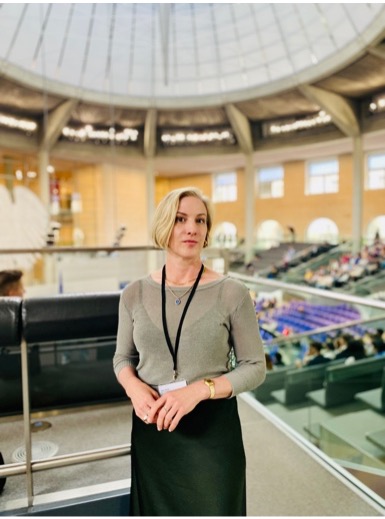
Eve Troeh, Wait What Productions, Los Angeles, California
Lucky. Perhaps others would not use this word to describe a summer 2025 deep dive into the US-German transatlantic relationship, but I will invoke it for our timing as RIAS journalism fellows. Our program came at a lucky and uniquely critical time, not only around the world stage of business and technology topics germane to the podcasts that I lead, but also for a quickly evolving digital media environment. The unique RIAS program led our cohort to probe deeper on economic, social and cultural topics – and I’ll highlight our NATO and European Commission visits, to start. For any news person, what could be more compelling than landing in Brussels and visiting NATO just ahead of a conference with historic implications for US cooperation, and largely hinging on German military commitments? From that major first day outing we delved deeper into big questions: what does European identity mean as the United States leans more nationalist and protectionist? We explored this vis a vis trade and politics, but also media coverage. We heard the phrase “a slow divorce” (between the US and Europe) floated from the Bruegel think tank early in the trip, and it haunted and propelled our questions for nearly every session after that. These topical sessions felt equal in importance and complementary to our opportunities to visit dynamic newsrooms in the midst of major change. It’s this mix of editorial content and production workflows that made the full RIAS experience so impactful. Take our session at RTL with their verification team lead, centered on spotting deep fakes and even telling the stories behind them, and then find us at Google’s Berlin headquarters for more on the relationship between German media outlets and the digital services giant. Plus, none of us will soon forget the visit to WELT and their television news operation, where we saw robotic cameras move across a studio floor during a live broadcast entirely autonomously – no human operators. Between sessions, as our time went on, the collegial relationships between fellows and insights from our program leaders became even more valuable. We found a generous, deeply knowledgeable and curious media expert in Executive Director Christoph. Program Officer Christina gave us a unique perspective on East Germany and more. I loved the curation of our cohort, with journalists from all corners of the US and so varied in media experience. In a time of fragmented audiences and mandates to serve an ever-growing number of digital formats, we benefited greatly from comparative frameworks – new ways of operating. The Bundespressekonferenz inspired all of us as a model of press and government relations we had never contemplated – with members of a free press as hosts, and the politicians arriving to speak on the “home turf” of the media. I think we were all impressed, curious and even envious of this monumentally different way of doing things in Germany, dating to World War II and the power dynamics of media and government. Our RIAS sessions resonated and built on each other as the program progressed. I was so fascinated attending a live session of German parliament, through my station days embedded with the Deutsche Welle Current Politics team. I got to see the new German chancellor brief his government on the nation’s message to NATO. The speeches from other party leaders after that – along with parliament’s reactions – were even more fascinating. When Bundestag member Metin Hakverdi briefed our entire group a few days later, his comments added so much context, nuance and even contradictions to the proceedings I had seen. Likewise, a visit with Felix Klein, Germany’s Federal Government Commissioner for Jewish Life, provided intense and important insight on the nation’s unique approach to combating anti-Semitism. Our dinner a bit later in the program with Lorenz Blumenthaler of the Amadeu Antonio Foundation added more layers of understanding and contemporary perspective to this sensitive, historic, and vital topic for Germany, the US, and the world. It was a delight to get this time with our RIAS cohort and leadership. Returning to my newsroom, I hardly know where to begin in sharing the lessons of the trip. On a personal note, I ended the fellowship on a rare note of optimism – believing that journalists supporting and believing in each other is an often neglected but vital part of our free press. Who knows our needs and norms better than us? Who can uphold them and strengthen them if not us? And who can see our role in a functioning economy and democracy all the better for experiencing them in a cross-cultural light? Now, we can.
